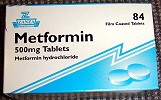Equine Insulin Resistance Metformin (Glucophage)
 You should AVOID this drug in horses for several reasons:
You should AVOID this drug in horses for several reasons:
1. Equine Insulin Resistance is high Insulin levels with normal Glucose levels. But Metformin is a human Diabetes drug that has one job – to lower Glucose. It makes no sense to give a drug to lower Glucose in a horse with already normal Glucose. Metformin is for Type 2 Diabetes which most horses never get. ![]() Click here – Does my horse have Horse Diabetes?
Click here – Does my horse have Horse Diabetes?
2. Oregon State’s Veterinary Research Team in May 2009 found this drug is not absorbed by horses. It is going in one end and out the other and so is your time and money. Conclusions of the Study: only 4-7% of Metformin giving orally 2 times a day is absorbed and is “insufficient to achieve plasma concentrations of drug comparable to the therapeutic range achieved by humans.” AJVR 2009, May, Dr. Hustace. ![]() Click here to see article Pharmacokinetics and bioavailability of meformin in horses.
Click here to see article Pharmacokinetics and bioavailability of meformin in horses.
3. Metformin had no effect on Insulin Sensitivity in horses. K. Tinsworth, Australian Science Symposium, 2010. ![]() Click here to see article Pharmacokinetics of metformin after enteral administration in insulin-resistant ponies.
Click here to see article Pharmacokinetics of metformin after enteral administration in insulin-resistant ponies.
4. Dr. Pratt, Professor at North Carolina State Universtiy, College of Vet. Med., stated, “Human drugs like Metformin have not proven to be effective in horses.” Morris Animal Foundation.
5. “Metformin is not an effective long-term mono therapy for increasing Insulin sensitivity in horses.” M. Vick, University of Kentucky Dept. of Vet. Sci, Reprod. 2006.
Click here to read Dr. Vick’s study
6. No FDA approval for use in horses – creates liability issues.
7. One small study in England, years ago, thought they saw effect, but no university or institute can replicate these findings. This study was before Oregon State’s Veterinary School found the drug was not even being absorbed in any useful manner. Also, the English study tried 2 times per day dosing which is difficult on clients. The cost to try it was over $2000.00 a year.
8. Severe side effects seen in people on this drug that you need to be aware of according to the Mayo Clinic – 2008:
- Lactic Acidosis (known as “Tie-up” in a horse). “Severe muscle pain and cramping.”
- Gastrointestinal Upset (known as “Colic” in a horse) “Need to take with food to reduce stomach and intestinal side effects.” “Vomit, stomach ache, passing gas, heart burn.”
- Thyroid Condition – Drug can interfere with Thyroid medicines. Some horses need Thyroid supplement.
9. Can suddenly not work anymore. “At some point this medicine may stop working and your blood glucose will increase.” Mayo Clinic, 2008.
10. Emergency Kit recommended. “Carry an Emergency ID Card and Glucagon Emergency Kit for emergencies” due to hypoglycemic reactions. Mosby’s Drug Guide. Not practical with horses.
11. Requires constant/multiple blood testing to monitor. More expense.
12. No study of long-term effects on horses. Your horse is not a guinea pig.
13. On package insert inside box of Metformin. “If lactic acidosis does occur, it can be fatal in up to half the people who develop it.”
14. Can cause severe respiratory problems. “Respiratory alkalosis may be an early adverse event induced by Metformin prior to developement of lactic acidosis.” Am J. of Therapeutics, 2004 .
15. 2013 Study on Metformin had multiple flaws in the experiment
A. Did not use Insulin Resistant horses – used young thoroughbreds and standardbreds that were normal AND which are not even Insulin Resistant. No idea if can help the horses with the problem.
B. Had to tube the Metformin 1 hour prior to feeding. This is not a real world situation. Are you going to treat your horse 1 hour before every meal? Treat at 6 AM, feed at 7 AM – Probably NOT! AND, horses are continual slow feeders, so Metformin effects are not working all day. Are you going to squirt Metformin in their mouths 24 times a day. Probably NOT!
C. They used large doses of Dexamethasone steroid to try to create Insulin Resistance in the healthy thoroughbreds and standardbreds. This is not how your horse became Insulin Resistant – highly artificial model and not the natural way Insulin Resistance happened in horses via genetics, diet, age, and management. ![]() Click here to see the article and why had problems and why 1 year later Metformin is not used with success.
Click here to see the article and why had problems and why 1 year later Metformin is not used with success.
16. Dr. Morgan’s 2015 study on equine metabolic syndrome found with metformin
a. “No perceived benefit from long term drug administration [of metformin]”
b. “Recent research shows a lack of efficacy of the drug on Insulin Resistance”
Click here for Dr. Morgan’s article
17. Metformin reduces Thyroid stimulating hormone in cases of underactive Thyroid – up to a 55% increased risk of low TSH.
![]() Click here for American Diabetes Association Study, Dr. C. Cappelli, 2009.
Click here for American Diabetes Association Study, Dr. C. Cappelli, 2009.
![]() Click here for 2014 Article about Metformin Causing Thyroid and Heart Problems, from the United Kingdom.
Click here for 2014 Article about Metformin Causing Thyroid and Heart Problems, from the United Kingdom.

![]() Click here to see 26 ways HEIRO is the Best Choice and why the winner over other products.
Click here to see 26 ways HEIRO is the Best Choice and why the winner over other products.
Proper diet and exercise is essential for horse health. This product is a supplement to help maintain horse health. This product is not intended to diagnose, treat, cure, or prevent disease.





; ?>/wp-content/themes/twentyten/img/NMImacLogo_150.jpg)






